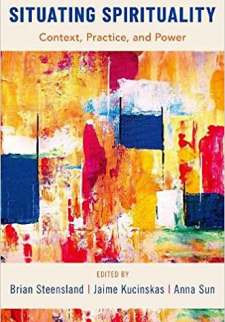Oxford University Press

Spirituality is in the spotlight. While levels of religious belief and observance are declining in much of the Western world, the number of people who identify as "spiritual but not religious" is on the rise. Practices such as yoga, meditation, and pilgrimage are surging in popularity. "Wellness" regimes offer practitioners a lexicon of spirituality and an array of spiritual experiences. Commentators talk of a new spiritual awakening "after religion." And global mobility is generating hybrid practices that blur the lines between religion and spirituality.
The essays collected in Situating Spirituality: Context, Practice, and Power examine not only individual engagements with spirituality, but they show how seemingly personal facets of spirituality, as well as definitions of spirituality itself, are deeply shaped by religious, cultural, and political contexts. The volume is explicitly cross-national and comparative. The contributors are leading scholars of major global regions: North America, Central America, East Asia, South Asia, Africa and the African Diaspora, Western Europe, and the Middle East. They study not only Christian, Jewish, and Islamic societies, but also non-Abrahamic societies with native as well as transnational sacred traditions.